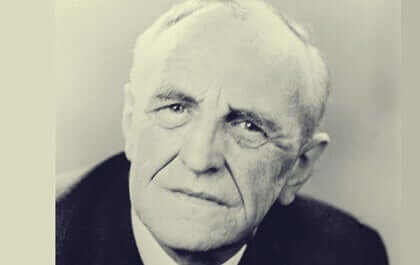What do you know about Donald Woods Winnicott’s biography?Many said he had an exceptional clinical genius. This pediatrician, psychoanalyst and English psychiatrist has helped thousands of parents better understand their children’s emotional lives.
It deepened the transition processes that promote the progressive individualization of the self, and thanks to it the foundations of the bond between mother and son have been defined.
- Winnicott’s theoretical and practical legacy was fundamental in the field of pediatrics.
- Often experts define him as an independent figure who has taken great steps in psychoanalysis.
She knew how to stand, with her own voice, between the Freudian and Kleinian currents (a focus inherited from Melanie Klein, creator of the theory of psychic functioning).
Throughout the 1940s, Donald Woods Winnicott published several researches and articles in the British Medical Journal. He wanted to have his own position in the field of child psychiatry and contribute to the advancement of this science.
He avoided, as far as possible, focusing on a single theoretical school to propose innovative ideas about the psyche of infants and children.
Even today, his books are still published regularly. The public, and in particular parents, are interested in such interesting works as “The First Dialogue” and “The Good and the Bad to Raise Children”.
“A mother is more effective than ever when she is based on her own criteria. “- RE. Winnicott-
Donald Woods Winnicott was born in Plymouth in 1896, to an upper-class family, linked to British politics and old traditions; as many of his biographies reveal, his childhood had a remarkable advantage, he said.
His father Frederick, a merchant and mayor of Plymouth, did not spend much time at home. He was raised by a loving, communicative and very close-knit mother. He had two older sisters and a nanny.
All this allowed him to grow up in a safe environment, in which he was able to express his fears and concerns without barriers and feel validated at all times. All of this undoubtedly had a great influence on his later works.
In 1910 he enrolled at Lays School to study science, then entered Jesus College, Cambridge, to study medicine. However, with the outbreak of World War I, the young Winnicott interrupted his studies to serve in the Navy.
After the war, Donald Woods Winnicott was able to complete his studies and specialize in pediatrics in 1920.
From that moment on he wanted to improve his training with the help of Melanie Klein, famous psychoanalyst who began with Sigmund Freud’s theories about the unconscious to develop his clinical practices with children, however, over time, there were several discrepancies between them.
The discrepancies between Klein and Winnicott were very large, however, he incorporated many of the psychoanalyst’s theories, such as the concepts of the inner world, the power of fantasy, and the usefulness of the game to see primitive defenses, fears, and states such as reactive depression. in children.
In 1931, he published Clinical Notes on Childhood Disorders. With this work, Winnicott has defined a more coherent and solid basis for psychoanalysis.
Colleagues, teachers and the psychoanalytic community itself presented their innovative ideas.
All this has been rewarded with awards of great importance in the academic field. He became president of the British Psychoanalytic Society and has always been an exceptional bridge between psychiatry and psychoanalysis. He died in London on 25 January 1971, at the age of 12. 74.
Winnicott’s work focused almost exclusively on the bond between mother and son, the maternal figure was for him the fundamental psychological support for the child to develop an authentic, healthy and happy self, these are the main contributions of Donald Woods Winnicott.
Maternal availability, absolute closeness, safe and affectionate, is what configures the psychic identity of the child. Without him, a baby doesn’t exist. You need this physical and emotional envelope to be able to grow in any way.
Transition processes are steps that allow children to move from one step to the next, doing so safely with the support of parents will ensure success.
An example of a transition is to move from breastfeeding to a solid diet, start talking after babbling, walking after crawling.
Through play, the child comes into contact with his or her sense of existence and identity. Is this a scenario in which you can imagine, test, experiment, share, learn, idealize?What happens in this psychic universe promotes its evolution.
Donald Woods Winnicott was a psychiatrist who focused his perspective on positivism, on the happiness present in the process of creation and education; In addition, he has always maintained the conviction that maternal instincts should be trusted, only they know what is best for their children all the time.
The danger of the false self arises in the child when he does not feel understood, understood, loved, it is then that he chooses to be another person. He will be someone with many needs who will always seek the attention of others.
It will be a small inhabited by voids that will not have the opportunity to individualize, to develop your personality in a healthy way.
In conclusion, as can be seen in Donald Woods Winnicott’s biography, his contributions have led to major changes in the evolution of psychoanalysis, highlighting the figure of parents (especially the mother) as the key to early childhood relationships.

